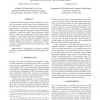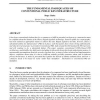252 search results - page 13 / 51 » On Robust Key Agreement Based on Public Key Authentication |
TCC
2007
Springer
14 years 2 months ago
2007
Springer
Assume that two distant parties, Alice and Bob, as well as an adversary, Eve, have access to (quantum) systems prepared jointly according to a tripartite state ρABE. In addition, ...
EWSN
2009
Springer
14 years 8 months ago
2009
Springer
We describe the design and implementation of a public-key platform, secFleck, based on a commodity Trusted Platform Module (TPM) chip that extends the capability of a standard node...
AINA
2007
IEEE
14 years 2 months ago
2007
IEEE
We propose a four-party password authenticated interdomain key exchange protocol which makes use of properties of identity-based cryptography and secret public keys. Being passwor...
ICASSP
2011
IEEE
12 years 11 months ago
2011
IEEE
Traditional channel quantization based methods for encryption key generation usually suffer from the quantization error which may decrease the key agreement ratio between authoriz...
ECIS
2001
13 years 9 months ago
2001
It has been conventional wisdom that, for e-commerce to fulfil its potential, each party to a transaction must be confident about the identity of the others. Digital signature tec...


